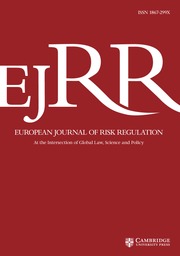Dans la même rubrique
- CEVIPOL
- FR
- Publications
- Articles
- Publiés en 2024
-
Partager cette page
EU Regulatory Polity 3.0 for Compliance with the Rule of Law: When Depoliticising Goals Lead to Uneven Politicisation
By Ramona Coman and Leonardo Puleo
ÉDITION
Cambridge University Press
COLLECTION
LIEN
COLLECTION
European Journal of Risk Regulation
LIEN

Abstract
Since limiting judicial independence in Hungary and Poland, the politics of the rule of law crisis have been examined by various scholars discussing conflicts within and between EU and domestic institutions. The rule of law is no longer a purely national affair – it is of high political salience both for the Member States and the EU polity. The question addressed here is: how has the rule of law crisis reshaped the EU’s modes of governance? We argue that to safeguard this common value, the EU is evolving into a regulatory polity (3.0). This development marks a shift from Majone’s EU regulatory state’s focus on regulating markets (1.0) and regulation in core state powers in times of crises (2.0) to regulation on the core values of the polity (3.0). The article shows that in a context of growing dissensus over the rule of law, EU institutional actors have sought to strengthen “rulemaking,” “rule monitoring” and “rule enforcement” through a regulatory approach anchored in a market logic. It also shows that shifting from the traditional regulatory state 1.0 to regulation in core state powers 2.0, the regulatory polity 3.0 strengthens the EU’s institutional capacity to act when the rule of law is under strain through depoliticised “rule monitoring” and politicised “rulemaking“ and “rule enforcement“ as illustrated in the cases of Hungary and Poland discussed in this article.
Mis à jour le 5 décembre 2024
